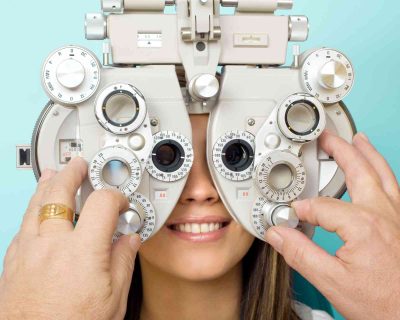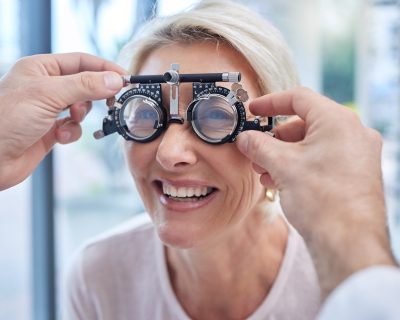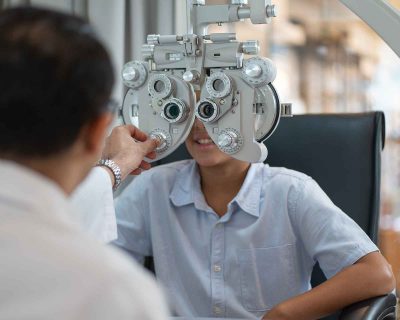
Prescription Eyeglasses vs. Contact Lenses: Which is Best For You?
Choosing between prescription glasses and contact lenses can be a difficult decision. Both are great options with their own set of perks. Picking between the two will depend on your lifestyle and needs. To help you decide with a trusted optometrist, let’s break down everything you need to know.
Weighing The Pros and Cons
Pros of Prescription Glasses:
Quick and Convenient: Wearing your glasses provides a speedy solution for your vision needs. No surgical procedures or waiting for recovery time is required – just put them on, and you’re ready to roll.
Style Variety: Glasses have transformed into a stylish accessory. You don’t have to hold yourself back since there are many designs out there to choose from. Use this opportunity to discover a style that complements your personality and elevates your overall appearance.
Non-Intrusive: Unlike contact lenses or surgical alternatives, glasses are non-intrusive. There’s no need to touch your eyes or go through any medical processes – simply put them on and enjoy clear vision.
Eye Protection: Glasses offer a shield against dust, debris, and harmful UV rays, adding an extra layer of defence for your eyes.
Cons of Prescription Glasses:
Obstruction: Some people find glasses obstructive, especially when engaging in physical activities or sports. The frames might get in the way or even break during rough activities.
Fogging and Smudging: Glasses can fog up in humid or cold conditions and get smudged, requiring frequent cleaning.
Distortion: In some cases, the lenses might cause minor distortions, especially if you have a strong prescription. This trait can take a bit of adjustment.
Compatibility with Other Eyewear: If you regularly wear sunglasses or protective eyewear, you might need to get prescription versions of those as well or use clip-on attachments.
Pros of Contact Lenses:
Natural Field of View: Contact lenses sit directly on your eyes, providing a more natural field of view without any frame obstructions. This characteristic is particularly advantageous for sports and other physical activities.
Enhanced Aesthetics: Since you place your contact lenses on your eyes, they don’t alter your facial appearance. This aspect can be a plus if you prefer your natural look without glasses.
No Fogging or Smudging: Unlike glasses, contact lenses won’t fog up in different weather conditions or get smudged, providing clear and unobstructed vision all the time.
Great for Active Lifestyles: Contacts can be more practical for those who lead active lifestyles or play sports, as they won’t move around or fall off during physical activities.
Vision Stability: Contacts move with your eyes, providing you with more stable vision than glasses that might shift when you move your head.
Cons of Contact Lenses:
Maintenance: Contacts require diligent cleaning and proper hygiene to avoid eye infections and discomfort. You need to follow a cleaning routine and replace them as recommended by your eye care professional.
Potential Discomfort: Some people find contact lenses uncomfortable, especially when they’re still getting used to them. Dryness, irritation, and a foreign body sensation are possible side effects.
Higher Cost: Contacts can be more expensive over time than glasses, especially if you opt for disposable or specialized lenses.
Risk of Infections: If not cared for, contact lenses can lead to eye infections, which can be uncomfortable and even become serious if not addressed promptly.
Learning Curve: Putting in and taking out contact lenses can be tricky at first. It requires practice and getting comfortable with touching your eyes.
Limited Wear Time: Depending on the type of lenses (daily, bi-weekly, monthly), you might need to remove them at night, which could be bothersome for some.
When to Use Prescription Glasses
- Eye Irritation or Sensitivity
If you have sensitive eyes or frequently experience eye irritation, wearing eyeglasses can be more comfortable. Contacts might exacerbate these issues.
- Dry Eye Conditions
Individuals with chronic dry eyes might find contact lenses uncomfortable due to decreased tear production. Your eyeglasses won’t contribute to dryness.
- Eye Infections or Allergies
If you’re prone to eye infections or allergies, contact lenses can increase the risk of complications. Your eyeglasses provide a barrier between your eyes and potential irritants.
- Limited Dexterity
Some individuals, especially elderly or those with certain medical conditions, might find it difficult to handle contact lenses. Eyeglasses offer a simpler solution.
- Special Eye Conditions
Certain eye conditions like keratoconus or severe astigmatism might be better managed with specialized eyeglasses rather than contact lenses.
- Safety Considerations
In certain work environments or activities that involve exposure to dust, chemicals, or other potential eye hazards, eyeglasses provide an extra layer of protection.
- Eye Rest
Giving your eyes a break from contact lenses at the end of the day can be refreshing. Wearing eyeglasses during these times lets your eyes breathe.
When to Use Contact Lenses
- Physical Activities and Sports
Contact lenses provide a wider field of vision and won’t slip or get in the way during active pursuits, making them ideal for sports and physical activities.
- Fashion and Style
Contact lenses allow you to showcase your natural beauty without the obstruction of eyeglass frames. This can be particularly appealing for those who enjoy experimenting with their look.
- Peripheral Vision
Contacts offer unobstructed peripheral vision, which can be advantageous for activities that require awareness of your surroundings, such as driving or cycling.
- Outdoor Activities
In situations where eyeglasses might fog up, get wet in the rain, or collect dirt, contact lenses remain unaffected and provide clear vision.
- Travel
Contact lenses can be more convenient during travel, as they don’t require carrying an additional accessory and won’t be affected by changing climates.
- Avoiding Glare
Eyeglasses can sometimes cause glare or reflections, which might be problematic in situations with bright lights or when using screens. Contacts eliminate this issue.
- Sensitivity to Frames
Some people find eyeglass frames uncomfortable or prone to causing allergies. Contacts offer a frameless and more comfortable option.
Making the Final Decision
Ultimately, the best way to make a choice is by discussing it with an optometrist. They’re the real vision experts. Some people even switch between glasses and contacts depending on the day. Just make sure to remember the perks of each eyewear to determine the right one for you.
Clarifying the Choice
Ultimately, going for a pair of glasses or contact lenses is a personal choice. Both options bring their advantages to the table. Just remember to prioritize clear vision, comfort, and the health of your eyes. And your optometrist is your partner in making the best decision for your eyes – style and clarity all wrapped into one.




